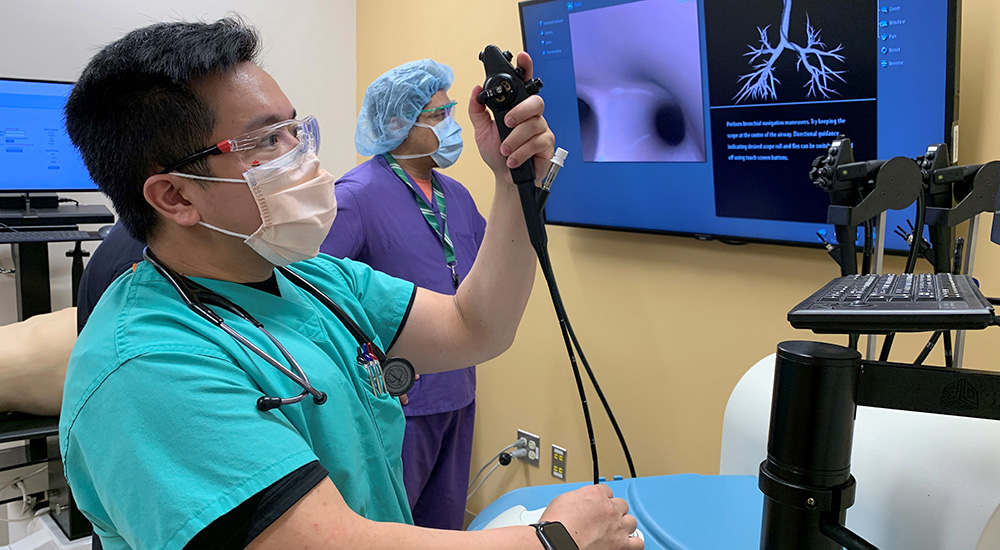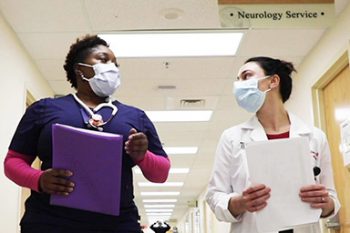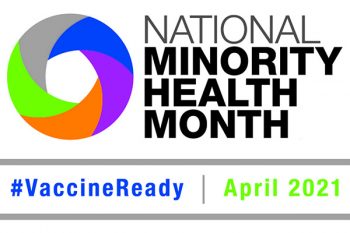April is National Minority Health Month (NMHM), a time to raise awareness about the health disparities that continue to affect racial and ethnic minority populations. Time to encourage action through health education, early detection, and control of disease complications.
The 2021 NMHM theme is #VaccineReady. The COVID-19 pandemic has disproportionately impacted racial and ethnic minority communities. It also has underscored the need to vaccinate these vulnerable communities without delay.
COVID-19 vaccination is an important tool to help us get back together with our families, communities, schools, and workplaces. It prevents the spread of COVID-19 and brings an end to the pandemic.
VA joins other federal agencies to focus on empowering vulnerable communities, which include many Veterans, to get the facts to be #VaccineReady. You can learn about COVID-19 vaccine at VA here.
This recent short news report “Medical centers working hard to vaccinate minority Veterans” provides insight on how VA is dealing with vaccine hesitancy in minority populations.
Academic affiliations key to VA’s diverse workforce
An important way VA empowers vulnerable communities to learn about the COVID-19 vaccine is by shaping a workforce that is culturally competent and reflects our diverse Veteran population. We want our patients to feel represented in their health care providers. We also want them to feel confident their unique needs are understood.
Moreover, research has shown that the most trusted information source on vaccination is a person’s own physician or health care provider.
Diversity in VA’s personnel helps bridge the gap in health care disparities. It creates relationships that build vaccine confidence and enable vulnerable communities to be #VaccineReady.
Efforts by VA’s Office of Academic Affiliation (OAA) are a key component in VA’s equitable health care strategy. It plays a major role in developing VA’s diverse workforce. OAA’s variety and depth of health professions training programs increase opportunities for racial and ethnic minorities and, correspondingly, improve health care experiences and outcomes for these groups.
More trainees are needed to help ensure equity. They also meet a rising demand among underserved populations within VA and across the nation. According to a report from the Association of American Medical Colleges (AAMC), “If underserved populations had health care use patterns like populations with fewer access barriers, demand could rise by an additional 74,100 to 145,500 physicians.”
Minority-serving institutions impact
OAA manages affiliations with more than 1,800 unique colleges and universities, including nearly 200 Minority-Serving Institutions (MSIs).
These include Historically Black Colleges and Universities (HBCU) and Hispanic Serving Institutions (HSI). Also, Tribal Colleges and Universities (TCU) and Asian American and Pacific Islander Serving Institutions (AAPISI).
Approximately 20,000 health professions trainees from MSIs train in VA each year.
In the 2020 academic year, OAA implemented the Veterans Healing Veterans pilot program. It provides full scholarship support to 12 Veteran medical students at each of the five Teague-Cranston and three of the four HBCU medical schools in exchange for a four-year service obligation at a VA facility.
Brandy Woods, a third-generation Veteran, is a recent recipient – read more about her here.
Minority Summit: The Power of Collaborating with VA
To strengthen and expand its relationships with MSIs, OAA is planning the “Minority Summit: The Power of Collaborating with VA” June 9, 2021.
Highlighting VA clinical training opportunities, VA scholarships and loan programs, and VA research grants, the summit aims to continue to increase diversity in the VA workforce. For inquiries about this virtual event, email: VHACOOAASummitSupport@va.gov.
Find out more about VA’s academic mission by watching this video and visiting the Office of Academic Affiliations recently updated website.
Resources:
- COVID-19 vaccines at VA.
- National Minority Health Month.
- Army Veteran awarded VA medical school scholarship “Veterans Healing Veterans” to shape diverse workforce, VAntage Point, Jan. 11, 2021.
- S. physician shortage growing, AAMC, June 26, 2020.
Clair Hill is a writer for Aptive Resources.
Topics in this story
More Stories
Bob Jesse Award celebrates the achievements of a VA employee and a team or department that exemplifies innovative practices within VA.
The Medical Foster Home program offers Veterans an alternative to nursing homes.
Watch the Under Secretary for Health and a panel of experts discuss VA Health Connect tele-emergency care.








